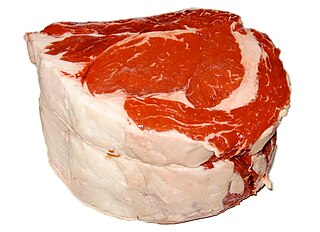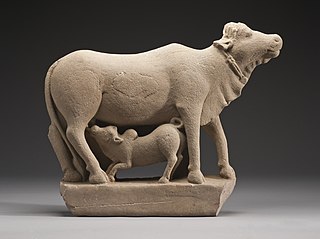Nimari or Nimadi may refer to:
- something from the Nimar region in Madhya Pradesh, India
- Nimadi language
- Nimari cattle, a breed of cattle
- Nimari, Bhiwani, a village in Haryana, India
Nimari or Nimadi may refer to:

Beef is the culinary name for meat from cattle. Beef can be prepared in various ways; cuts are often used for steak, which can be cooked to varying degrees of doneness, while trimmings are often ground or minced, as found in most hamburgers. Beef contains protein, iron, and vitamin B12. Along with other kinds of red meat, high consumption is associated with an increased risk of colorectal cancer and coronary heart disease, especially when processed. Beef has a high environmental impact, being a primary driver of deforestation with the highest greenhouse gas emissions of any agricultural product.

The zebu, sometimes known in the plural as indicine cattle, Camel cow or humped cattle, is a species or subspecies of domestic cattle originating in South Asia. Zebu, like many Sanga cattle breeds, differs from taurine cattle by a fatty hump on their shoulders, a large dewlap, and sometimes drooping ears. They are well adapted to withstanding high temperatures and are farmed throughout the tropics.

There are varying beliefs about cattle in societies and religions.

Khandwa is a city and a nagar nigam in the Nimar region of Madhya Pradesh, India. It is the administrative headquarters of the Khandwa district, formerly known as East Nimar District.

The Bhil languages are a group of Indo-Aryan languages spoken by around 10.4 million Bhils in western and central India as of 2011. They constitute the primary languages of the southern Aravalli Range in Rajasthan and the western Satpura Range in Madhya Pradesh, northwestern Maharashtra, and southern Gujarat. According to the 52nd report of the commissioner for linguistic minorities in India, Ministry of Minority Affairs, Bhili is the most commonly spoken language of the district of Dadra and Nagar Haveli constituting 40.42% of its total population. Bhili speakers are also significant in the states of Gujarat (4.75%), Madhya Pradesh (4.93%) and Rajasthan (4.60%).
Sindhi may refer to:

Khargone district, formerly known as West Nimar district, is a district of Madhya Pradesh state in central India. The district lies in the Nimar region and is part of the Indore Division. The district headquarters is the city of Khargone, which lies south of the Indore metropolis, the headquarters of Indore district.

Burhanpur District is a district of Madhya Pradesh state in central India. The city of Burhanpur is the district headquarters.

Dhar district is a district of Madhya Pradesh state in central India. The historic town of Dhar is administrative headquarters of the district.

Khandwa district, formerly known as the East Nimar district, is a district of the Madhya Pradesh state in central India. The city of Khandwa is the administrative headquarters of the district. Other notable towns in the district include Mundi, Harsud, Pandhana and Omkareshwar.
Kandhari is an Indian (Khatri) toponymic surname indicating association with Kandahar province, Afghanistan.
Panchami is the fifth day (tithi) of the fortnight (paksha) in the Hindu lunar calendar.

Bohag Bihu or Rongali Bihu also called Xaat Bihu is a traditional ethnic festival celebrated in the Northeastern Indian state of Assam and other parts of Northeastern India by the indigenous ethnic groups of Assam, and marks the beginning of the Assamese New Year. The festival is of mostly aboriginal origin comprising Tibeto-Burman and Tai elements. It usually falls in the 2nd week of April, historically signifying the time of harvest. Every year it falls on the 14th day of April. The holiday unites the different native communities of Assam regardless of their backgrounds and promotes the celebration of ethnic diversity.
Naramdiya Brahmins, also transliterated as Naramdev, are descendants of the priests of the Somnath temple who were forced to migrate from Gujarat to Madhya Pradesh are settled along the bank of the Narmada River. Their migration owes to the forays and desecration of the Somnath temple by Mahmud Ghazni.
Nimadi is a Western Indo-Aryan language spoken in the Nimar region of west-central India within the state of Madhya Pradesh. This region lies adjacent to Maharashtra and south of Malwa. The districts where Nimadi is spoken are: Barwani, Khandwa, Barwaha, Khargone, Burhanpur, Bedia, Sanawad and southern parts of Dhar, Harda and Dewas districts. The famous writers of Nimari were Gaurishankar Sharma, Ramnarayan Upadhyay, surendra khede etc.
Surpala is a village situated in Khargone District of Madhya Pradesh, India. Surpala belongs to Barwaha Tehsil and Khargone District. It is located in the area known as West Nimar.

Cattle slaughter in India, especially cow slaughter, is controversial because of cattle's status as endeared and respected living beings to adherents of Dharmic religions like Hinduism, Buddhism, Sikhism and Jainism. Also, many of the Zoroastrians/Parsis living in India stopped eating beef out of respect, as it is sacred for the people of Dharmic religions; while it is an acceptable source of meat in Abrahamic religions like Islam, Christianity and Judaism. Cow slaughter has been shunned for a number of reasons, specifically because of cow's association with Lord Krishna in Hinduism, and because cattle have been an integral part of rural livelihoods as an economic necessity. Cattle slaughter has also been opposed by various Indian religions because of the ethical principle of Ahimsa (non-violence) and the belief in the unity of all life. Legislation against cattle slaughter is in place throughout most states and territories of India.

Nimari (Hindi:निमारि) is a breed of cattle native to the Nimar region of India. It originated out of Gyr (cattle) and Khillari cattle breeds, and is found in the regions of Narmada valley in the state of Madhya Pradesh and Jalgaon district in Maharashtra.

Papad ki Bhaaji or Papad ka Saag is a vegetarian main course dish made using Papad and is popular in Rajasthani, Gujarati, Bundeli, Malwi, Nimadi and Braj cuisines. The dish is prepared with many variations and is also known by the name Papad ro saag in Rajasthani and Papad nu shaak in Gujarati. Papad ki bhaaji can be easily prepared with few basic ingredients at home and without the need of any vegetable. Hence it typifies the simple food that one needs for sustenance amidst the hardship of desert life.

Nimari Keith Burnett is an American college basketball player for the Michigan Wolverines of the Big Ten Conference. He previously played for the Texas Tech Red Raiders and Alabama Crimson Tide.